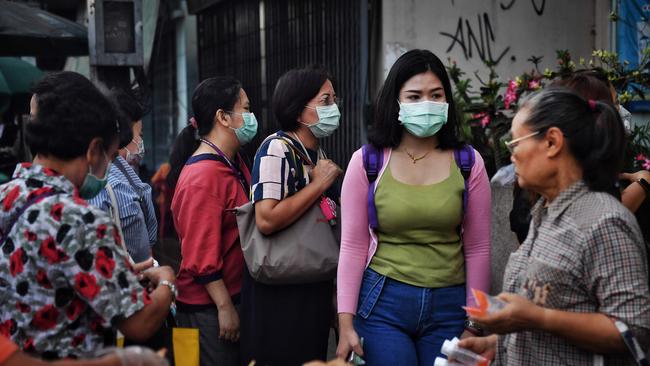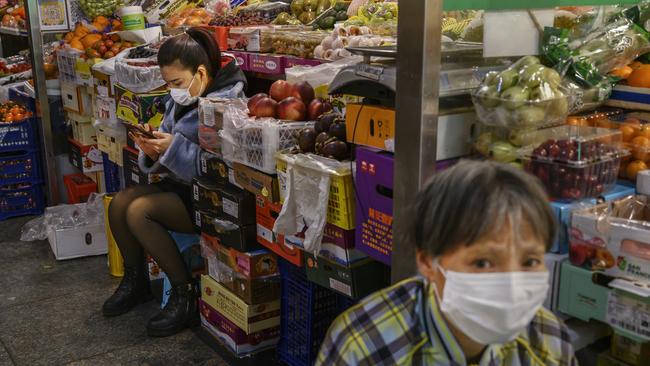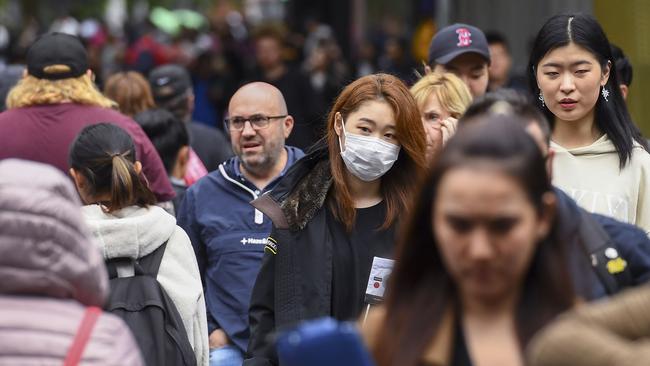Virologist expects thousands of coronavirus cases until at least July
UNSW virologist Peter White expects coronavirus cases to grow until at least June, when the flu season will also peak, and says slowing down its progress is crucial to the medical system’s ability to cope. Read his advice for dealing with the virus.
NSW
Don't miss out on the headlines from NSW. Followed categories will be added to My News.
Q and A with Australian virologist UNSW Professor Peter White.
China has seen a decline in infections and deaths suggesting they have peaked, and transmission is slowing down. Meanwhile, Australia has seen more cases. Do you think we have hit a peak and will be declining soon?
It all depends on how well we can contain (it) … but certainly this is not the peak because we are seeing an increase in infections and cases everyday.
When you’re looking at the early stages you're going to have low numbers which will increase rapidly which is what we saw in China.
What we can see in China is that there is a peak of both deaths and new infections a few weeks ago and that's a good thing, and that basically means it is going to last for four months if we follow the same model as them.
It is likely we will see a global pandemic.

When will Australia hit its peak and are we taking proper action?
What we are doing at the moment is good and we are taking it more seriously than we did many other viruses in the past. For China, their beginning was December and it took them four months before their cases started to decline. This means it is only the beginning for us and other countries, and it will only be around June or July before we see the real peak.
Would Australia ever reach the point of thousands being infected?
It is going to happen for sure. Look at Italy, they started with 50 and then went to hundred and then thousands. It is a sophisticated and developed country and that's the same pattern that is looking to happen in France and the UK.
We are going to get thousands of infections. In 2017, when we had a bad flu and the vaccine was only 20 per cent protective against that strain and we had 13,000 hospitalisation and 3000 deaths.
We could expect something like that.

Is it worrying that some of the cases confirmed this week have not travelled anywhere and it was a human-to-human transmission?
Tracking the source is possible and they're already doing that with the close contacts in the aged care worker. It is harder to track when they haven't come from overseas and we have to go trace their point contact and quarantine them all for two weeks and that's what is being done now. This is a highly infectious virus and really you will never be able to contain it 100 per cent.
Should we follow suit and put places like schools into lockdown?
In the UK they have paused schools and a couple of other measures. There is no point in doing that at the moment because we only have a small amount of cases and that would be a complete counter intuitive. If the outbreak got big enough and to slow it down then we should consider those measures for sure but I need the outbreak to get bigger before we consider the measures.
There have been images of mass hysteria, with shelves completely wiped out of products like toilet paper. Do you think people are fully aware of the symptoms they should be looking out for?
People are always going to prepare themselves and do some panic buy in these situations. The symptoms of this virus are like any common cold or influenza, there is very little difference. In fact you cannot tell the difference. The only real difference but would not want to use it as a diagnostic criteria, is that this one has more of a dry cough.

Results from the coronavirus test can take 24 hours or more before they are released. In China, they can have an answer for you in four to seven hours. Can we be getting results more quickly?
It is just about resourcing. The actual test itself only takes about 3 hours but the staff and how many tests they are running is what that is all about. But very soon there will be a point of care testing dip sticks — like pregnancy tests — and will have those tests out quite soon I imagine.
If results from the test can be done so quickly, is it possible that the health system is feeling a strain and is not able to keep up?
There is almost no strain on the health system yet because there are less than 60 cases, wait until we have 40,000 that will be a strain. We are doing what we can, the more we can slow the outbreak down the better. If we are going to get 40,000 cases we don't want 40,000 next week but if we could spread that over a month or two then we would cope better. So transmission control strategy is the best we could do against this virus.
It has been identified that the spread of the virus is driven mainly by families. What are some of the measures that can be done to stop that spreading in that particular environment?
I doubt you would ever be able to know exactly how the virus is spreading whether it is through transport systems or families. Some of it will be families spreading it for sure that's a normal transmission from person to person, but some of it will be transport or a gathering at big events. But I doubt this is any different from other respiratory viruses.
It is a very common way to get a virus from the family but there are things you could do. If you are infected make sure you put your tissues in the bin, wash our hands regularly and don't sneeze over people so just the normal hygienic practices you would do to stop germs being passed on. Anything you can do to stop the transmission in the family group will help but it is going to be very difficult because it is very infectious.
While deaths are occurring at higher rates in elderly people, there have been confirmed cases of young people including a woman in NSW aged in her 30s and in some places around the world there are young people dying too. What’s going on there?
Everyone is susceptible to this virus because there is no herd immunity. Unless You have had it, everyone has the same susceptibility.
In three years time when the herd community builds up and a quarter of the planet may have been infected by the virus then this virus can only infect the other 75 per cent so it will have less people or infect. That's what happens with every virus. The elderly are no longer susceptible, but they are more susceptible to more severe illness.
Should we be most worried about aged care facilities? And what can be done to prevent further spreading in the facilities?
Those facilities often get virus outbreaks and have practices in place already. Affected patients are isolated, health care workers and nurses will wear personal protective equipment and clothing, extra cleaning these are the things they do and perhaps if you really want to take further measures sometimes they stop visitors from coming in or they screen visitors as they come in.

How does the coronavirus compare to the norovirus?
It's probably at the moment because there's no herd immunity. It's probably about the same now, I'd say. And the example I've been using for that is, you know, big norovirus outbreak.
Remember, people there will be some partial immunity to previous norovirus infections that people have had.
It's a highly infectious virus when the most infectious viruses that we know that when you get a cruise ship, you get maybe 500 people out of 3000 infected.
That's a pretty big outbreak on a cruise ship. Haven't seen any bigger than that.
Often it's about a hundred but with this one on a cruise ship in Japan, we saw 700 out of 3,800. So that's the sort of similar ratio to a big norovirus outbreak, which tells me that it's a highly infectious human virus.
Can you be reinfected after recovering from the coronavirus?
We don't know the answer as far as I know. People are working towards that. But if you were to be reinfected, the chances are you would not be as sick.
You would have immunity from the first infection. You know, you would have T-cells and antibodies to protect you.
So you may be sick, but you're certainly not going to be as sick as the primary acute infection. That's what we see with viruses.
Researchers are working on a vaccine for the deadly virus. Is it possible to have the vaccine done in time and will it save people?
We might be able to get a vaccine for this virus, but it's going to take two or three years before we do. And it's going to be very difficult because we don't have any vaccines for viruses like this virus.
Coronavirus is the largest and most complex RNA virus that infects humans and they're difficult to make vaccines against.
And, you know, vaccines can be much harder to make than an antiviral.
So we're more likely to be able to cure people than we are to get a vaccine and prevent them from being infected in the short term.
The vaccine will make no difference in terms of this current epidemic/pandemic. But if there are future ones we might be able to ring fence like we've done with ebola and use the vaccine; basically vaccinate all close contacts and that has been quite successful in Africa.
What were the biggest vulnerabilities in Australia, and what are you most worried about?
My major concern at the moment is that people seem to be quite susceptible to severe illness from this virus. And we know the viruses can spread easily through old people's homes.
I think extra precautions should be taken in aged care facilities at this stage and we are doing that. But we could do a little more there.
But I think we're doing pretty much what we can at the moment. This is going to probably end up being a bit like Swine Flu.
Swine Flu was something we tried to contain and could not and then became a global pandemic. But that virus probably wasn't quite as nasty as the current one.
The key questions for us is when the epidemic is going to peak. Will it be 10 weeks as some experts have predicted? Another big question is how is it going to interact with the start of the flu season in June? How do you know if you've got coronavirus or flu if the epidemics peaking at the same time as the flu season starts?
So there are some critical issues there. We are going to be more diagnostic testing and work out whether you have flu or coronavirus, which means the number of tests are going to increase.
People should definitely perhaps make a bigger effort this year to get a flu vaccination. That would be very sensible even though the flu vaccine isn't the best vaccine.
They are only about 50 per cent protective, but that 50 per cent is better than zero per cent.
If every Australian got the flu vaccine, we would halve the flu cases and that can’t be a bad thing when we have a coronavirus.

